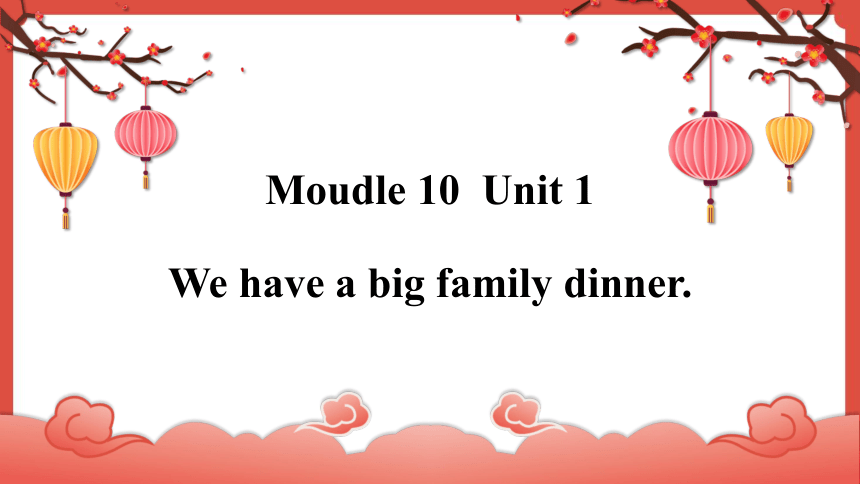(
课件网) Moudle 10 Unit 1 We have a big family dinner. 学习目标 1. 能听懂,会说 family, dinner, year, New Year, Chinese, festival, the Spring Festival, peanut 等词 2.能听懂并会说句子: Happy New Year ! At the SpringFestival, we have a big family dinner. We have peanuts and sweets. 3. 能够熟练运用句型At the spring Festival, we have/say...描述春节的主要活动和食物,并能运用这些句子进行交流。 Catalogue Vocabulary Text Grammar Practice Vocabulary Vocabulary family / f m li/ n. 家庭 【拓展】把家当作一个整体为“家庭;家时, family视为单数。 把重点放在家庭的每一个成员时,为复数。 【例句】It's a photo of my family. 这是一张我们的全家福。 dinner / d n (r)/ 晚饭,正餐 【拓展】breakfast 早饭;lunch 午饭;supper 晚饭 【短语】 have dinner 吃晚饭 【例句】It's time for dinner. 该吃饭了。 Vocabulary year /j (r)/ 年 【拓展】 day 天 month 月 week 周 【拓展】New year 新年 【例句】Happy New Year! 新年快乐! Vocabulary Vocabulary Chinese / t a ni z/ 中国的,中国人 【拓展】China 中国 【例句】Chinese live in China and speak Chinese. 中国人住在中国,讲汉语。 festival / fest vl; fest v l/ 节日 【拓展】the Spring Festival 春节 the Mid-autumn Festival 中秋节 the Dragon Boat Festival 端午节 【例句】My favorite festival is Spring Festival.我喜欢的节日是春节。 Vocabulary Vocabulary the Spring Festival / spr fest vl/ 春节 【短语】spring 春天 【例句】Eating dumplings at the Spring Festival is traditional in China. 春节吃饺子是中国的传统。 I see. /a si / 我明白了。 【短语】see /si:/ 明白;看见 Vocabulary peanut / pi n t/ 花生 【短语】pea (豆)+ nut (坚果)=peanut 花生 【例句】 I have a packet of peanuts. 我有一袋花生。 Vocabulary Text Listen and chant. Happy New Year! 新年快乐! Happy Chinese New Year! 春节快乐! Happy Spring Festival! 春节快乐! Listen, point and find "we..." 你好,萨姆。这里有一本书给你。 哦,谢谢你!是关于什么的 1.Here's... for you.这 里有……给你。 介词for:给某人 2.介词about: 关于…… Listen, point and find "we..." 是关于春节的。 春节是什么 1.介词about: 关于…… Listen, point and find "we..." 是中国的新年。。 在春节,我们有一个大的家庭晚餐。 噢,我明白了。 1.We have a big family dinner. 这里have 表示吃,吃晚饭。 2.I see. 我明白了。 Listen, point and find "we...". 我们有花生和糖果。我们说:“新年快乐!” 我喜欢糖果。 我喜欢花生。 1.We have peanuts and sweets. we是我们,第一人称复数主格。 这里have表示吃。 2.1 like sth. 我喜欢某物。 like + 可数名词复数 Listen and say. 哦,不。现在不是春节。 3.the Spring Festival 春节 注意首字母大写;festival表达的节日前要加定冠词the the Dragon Boat Festival 端午节 大明,新年快乐。 给你。 1) have+表示一日三餐的名词,意为“用餐”。 比如: have breakfast/lunch/supper吃早餐/午餐/晚餐 2) have+表示食品、饮料等名词,意为“吃、喝”。 比如: have (some) bread吃面包 have eggs for breakfast早餐吃鸡蛋 have 用法 3) have+表示动作的名词 比如:have a rest休息一下 have a drink喝一点 4) have+表示某种活动的名词,意味“进行、举行”。 比如:have a class上课 have a birthday party举行生日聚会 5) have+其他 ... ...

